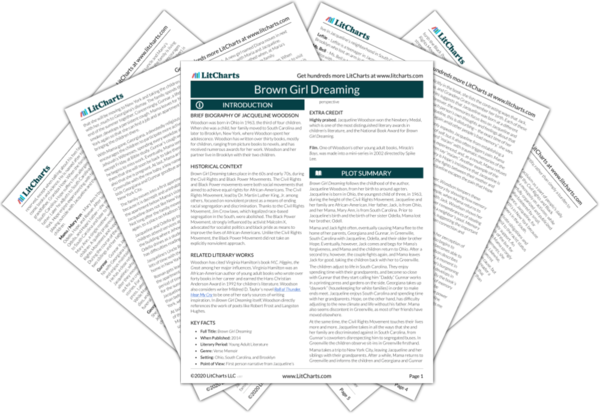Throughout Brown Girl Dreaming, religion features prominently in Jacqueline’s life, though her views of religion expand and change throughout the book. Through the eyes of Jacqueline, Woodson explores the benefits, contradictions, and limits of organized and unorganized religion, contrasting various sects of Christianity and Islam with more abstract forms of spirituality.
In her early years, after the family moves back to South Carolina, Jacqueline and her siblings practice as Jehovah’s Witnesses under the watchful eye of her grandmother, Georgiana. Georgiana is extremely pious, and, despite Mama’s will that the children be able to explore religion on their own, Georgiana encourages the children to attend Kingdom Hall, the Jehovah’s Witness church. After Mama leaves for New York, Georgiana intensifies the children’s religious education, structuring their lives around bible study, services, and trips to proselytize to neighbors.
Jacqueline follows Georgiana’s routine without resistance, and it is through religion, in the form of Bible stories, that Jacqueline first begins to understand her love of storytelling. Still, Jacqueline fails to grasp the meaning of the religion she follows, and she worries about the ethics of some of the teachings of Jehovah’s Witnesses. This is particularly apparent in Jacqueline’s dismay over the idea that people who do not attend services will be unable to access heaven; Gunnar, an extremely kind, loving person, does not attend church, which sows doubt in Jacqueline about her religion’s inflexibility. In Gunnar, she sees an alternative example of morality—one in which people, rather than the institution of the church, come first.
Jacqueline’s doubts continue to grow over the course of the book: she wonders why women cannot give the sermon in church, she is disturbed when an elderly woman interested in the religion is left out because she cannot afford the cost of the pamphlets, and Jacqueline feels excluded from her peers by not being allowed to participate in the pledge of allegiance and birthday celebrations. As Jacqueline realizes that she is not a true believer, though, she encounters other, alternative forms of religion in New York. She meets Maria, who practices a different sect of Christianity. She also observes her mother’s spiritual practice; Mama does not attend services, but instead favors more abstract forms of spirituality, like a belief in fate. Later, after Robert is released from prison, Jacqueline observes him practicing Islam, and is especially enthralled by the idea of Mecca as a faraway, imagined space.
As Jacqueline comes in contact with different theological inclinations, she forms a set of beliefs that she enumerates in the second to last poem. These beliefs include, among other things, God, the Bible, the Qur’an, Christmas, the city, the South, Black people, good friends, Brooklyn, the future, and the present. For Jacqueline, this combination of aspects of different religions and seemingly secular things isn’t a contradiction—all the elements complement each other. By showing Jacqueline’s journey away from a strict, organized form of religion and her turn towards a more eclectic, pluralist spirituality, Woodson suggests her support for the latter as a model of a healthy spiritual life.
Religion and Spiritualism ThemeTracker

Religion and Spiritualism Quotes in Brown Girl Dreaming
But I want the world where my daddy is
and I don’t know why
anybody’s God would make me
have to choose.

Unlock explanations and citation info for this and every other Brown Girl Dreaming quote.
Plus so much more...
Get LitCharts A+We take our food out to her stoop just as the grown-ups
start dancing merengue, the women lifting their long dresses
to show off their fast-moving feet,
the men clapping and yelling,
Baila! Baila! until the living room floor disappears.
When I ask Maria where Diana is she says,
They’re coming later. This part is just for my family.
Some evenings, I kneel toward Mecca with my uncle.
Maybe Mecca
is the place Leftie goes to in his mind, when
the memory of losing his arm becomes too much. Maybe Mecca is
good memories,
presents and stories and poetry and arroz con pollo
and family and friends…
And all the worlds you are—
Ohio and Greenville
Woodson and Irby
Gunnar’s child and Jack’s daughter
Jehovah’s Witness and nonbeliever
listener and writer
Jackie and Jacqueline
gather into one world
called You
where You decide
what each world
and each story
and each ending
will finally be.











